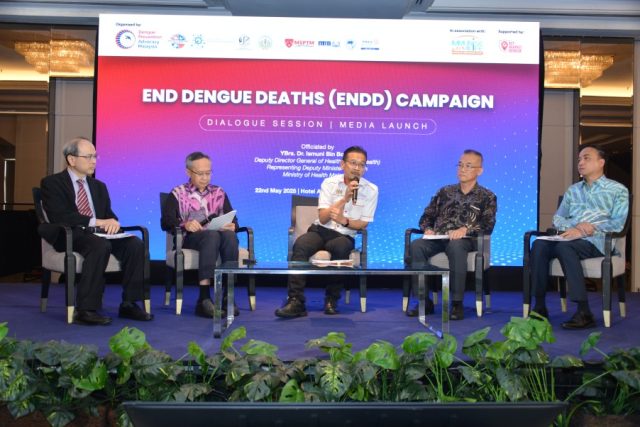
Kuala Lumpur, 22 May 2025 – Zero preventable dengue deaths is not just a dream. It’s a real, achievable goal.
By taking four simple steps — 1) destroy mosquito breeding ground, 2) prevent mosquito bites, 3) get vaccinated, and 4) seek early treatment when experiencing symptoms — every Malaysian can help protect themselves and their loved ones from this deadly disease.
This was the urgent call sounded at the launch of the END Dengue Deaths (ENDD) campaign today, led by Dengue Prevention Advocacy Malaysia (DPAM), in association with Immunise4Life (IFL). The event was officiated by Dr. Ismuni Bohari, Deputy Director-General of Health (Public Health), on behalf of YB Dato’ Lukanisman Bin Awang Sauni, the Deputy Minister of Health.
Zero Deaths is Possible with Collective Action
Dengue remains a public health priority in Malaysia. Among all communicable diseases, incidence rate of dengue fever is reported to be third highest after COVID-19 and Hand, Foot & Mouth Disease (HFMD) in 2023. In 2024, the Ministry of Health (MoH) Malaysia has reported 122,323 cases and 117 deaths, marking a 0.57% decrease in cases and a 17% increase in deaths compared to 2023. This has resulted in a slight increase in case-fatality-rate (CFR) in 2024, underscoring the need to sustain and strengthen dengue prevention and management efforts.
Over the years, the MoH has implemented various approaches to tackle dengue, combining cutting-edge technology, community engagement, and strong enforcement measures.
The iDengue Portal, introduced in 2012, has been instrumental in providing the public with vital information, including daily case updates, hotspot locations, and updates on mosquito control operations. In high-risk districts, Pest Control Operators (PCOs) carry out larviciding and space spraying to reduce mosquito populations. An innovative approach to vector control has been the release of Wolbachia-infected Aedes mosquitoes. This method has significantly reduced dengue cases in 10 localities by 50-80%.
Professor Datuk Dr. Zulkifli Ismail, Chairman of DPAM and IFL, applauds MoH for its consistent effort in combating dengue throughout the years. However, he emphasised that active participation from other stakeholders including civil society and corporate entities are essential. “Every death from dengue is a preventable tragedy. With collective effort, we can achieve zero preventable dengue deaths by 2030, in line with the global target set by the World Health Organization (WHO),” he said.
DPAM’s Initiative to help End Dengue Deaths
Professor Datuk Dr Zulkifli Ismail highlighted, “DPAM aims to synergise efforts by various stakeholders in assisting the MoH to achieve national and global dengue targets through the strengthening of dengue prevention, management, and control in Malaysia”. He also explained that DPAM advocates for a 360-degree approach to tackling dengue, covering epidemiology, integrated vector management, environment, patient care, laboratory, and vaccines.
“We have been actively empowering healthcare professionals through workshops and masterclasses. We have also contributed to policy through initiatives like the DPAM Resolution Paper, and a policy recommendation paper developed in collaboration with the Selangor Public Health Advisory Council (SELPHAC). Now, through the ENDD campaign, we are turning our attention to the public — to educate, empower, and encourage every individual to take action. Together, we can achieve our goal of zero preventable dengue deaths,” he said.
The Human Cost of Dengue: Why We Must Act?
During the launch, the audience witnessed the human toll of dengue through the voices of survivors and those left behind. One common thread ran through them all: dengue doesn’t strike just one person — it often hits multiple family members at the same time.
Julaikha battled dengue when she was just six years old, while both her parents were also infected. Her parents were hospitalised, with her mother critically ill in the ICU. Julaikha had to stay with her aunt, separated from her parents during one of the most frightening moments of her young life, yet too young to understand the full gravity of the situation. “No child should have to go through that,” she shared.
Jovita was admitted to hospital for dengue and her blood tests showed dangerously high liver enzymes, but her greatest fear was not for her own health. Her mother, warded in the ICU at the same time, was suffering from multi-organ failure due to severe dengue. “Doctors told us she might not make it. It was a nightmare,” she recounted. “Thankfully, we both survived and I feel grateful to the doctors who treated us. But the experience left us drained — physically, mentally, emotionally,” she added.
The most devastating account came from Firdaus, who lost both his parents to severe dengue within days of each other. “People think dengue is just a fever. But for me, it took both my parents — just like that,” he said, urging the public to take the disease seriously.
These haunting stories underscore a brutal truth: Dengue is not to be underestimated — it’s a deadly threat that can upend lives in an instant.
Think You’re Safe from Dengue? Think Again
Drawing from his frontline experience, Dr Benedict Sim, Infectious Disease Consultant, representing Malaysian Society of Infection Control and Infectious Diseases (MyICID), reinforced that the disease can affect anyone and that managing severe cases remains challenging. “Despite the best medical efforts, severe dengue can be fatal. Prevention is always better than cure,” he emphasised.
He also highlighted that misconceptions are still widespread. “Many people believe once you’ve had dengue, you’re safe. That’s wrong. The reality is that there are multiple dengue virus serotypes, and reinfection can lead to a higher risk of severe dengue,” he said.
Another common belief is that young and healthy individuals are not at risk. He pointed out, “On the contrary, nearly 45% of dengue deaths in 2023 occurred among adults aged 20 to 49 years.”
4 Simple Steps: What Every Malaysian Can Do
Dr Koh Kar Chai, Chairman of the ENDD Campaign, outlined the four simple but powerful actions the public can take: 1) destroy the breeding ground of mosquitoes, 2) prevent mosquito bites, 3) get vaccinated, and 4) seek early treatment when experiencing symptoms.
“These steps can truly save lives,” he stressed. “While the government strengthens policies and vector control efforts, the community must act at ground level. Together, we can break the chain of dengue transmission and end dengue deaths.
The campaign intends to make information about dengue prevention accessible and reachable to the Malaysian public. We will disseminate expert videos and public service advertisements through commonly used social media platforms in the country. The public will have access to information about dengue prevention in Bahasa Malaysia and English, through the campaign website at enddenguedeaths.dpam.org.my.
Dr Koh also expressed appreciation to Takeda Malaysia Sdn. Bhd. for their consistent support in helping DPAM conduct its educational activities to promote dengue prevention.
Vaccination: An Important Shield Against Severe Dengue
Professor Dr Zamberi Sekawi, Chairman of the Dengue Vaccine Position Paper, stressed that vaccination is a vital tool in the fight against severe dengue.
He highlighted that TAK-003, a dengue vaccine currently available in private clinics and hospitals in Malaysia, has demonstrated over 80% effectiveness in preventing symptomatic dengue infection and over 95% effectiveness against dengue hospitalisation within the first year after vaccination. “This vaccine has a strong safety profile, backed by 4.5 years of clinical study,” he added.
Common side effects include mild pain or redness at the injection site, while serious adverse reactions such as anaphylaxis are extremely rare. As a precaution, recipients are advised to stay at the clinic or hospital for at least 15 minutes after vaccination for observation.
Prof Dr Zamberi also said that TAK-003 has been widely used in several dengue-endemic countries such as Indonesia, Brazil and Vietnam. In Indonesia, for example, as of October 2024, the East Kalimantan Provincial Health Office has vaccinated over 8,800 elementary school children in Balikpapan. In Vietnam, the uptake of out-of-pocket dengue vaccinations at one of the country’s most prominent vaccination centres was reported to be at 150,000 doses within 3 months, nationwide. “Vaccination doesn’t just help prevent symptomatic dengue, it helps keep people out of hospitals. Everyone aged 4 years and above should seriously consider getting protected,” he urged.
DPAM calls on the media, civil society, and all Malaysians to spread the ENDD campaign messages and drive collective action.
Every life is precious. Together, let’s end dengue deaths!











